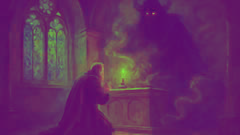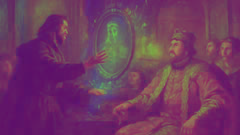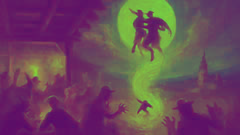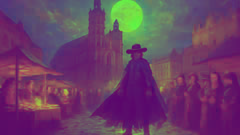Introduction
In the heart of Renaissance Poland, where cobbled streets curled beneath the mighty towers of Kraków and the air forever buzzed with the chatter of markets and scholars, the name Pan Twardowski carried a weight that hovered between awe and dread. He was a man of paradoxes: learned and reckless, devout and dangerously curious, famed as a healer and whispered about as a sorcerer. Twardowski’s story had become embroidered into the fabric of Polish folklore, a shimmering thread that linked the mundane with the magical and the living with the mysterious shadows of the afterlife. Each night, as villagers gazed at the pale silver coin of the Moon rising over the Vistula River, children nestled at their parents’ knees to hear the story again—of a man who sought forbidden knowledge and paid a price that reached beyond the boundaries of Earth itself.
Few could say where Pan Twardowski’s journey truly began. Some insisted he was born the son of a simple nobleman, others claimed his mother was a village wise-woman with secrets of her own. But all agreed that his thirst for learning drew him to Kraków, where the great university attracted minds as bright as any in Europe. There, among tomes and tinctures, Twardowski’s ambition swelled. Medicine fascinated him, yet he soon grew impatient with mortal limits, craving to heal what none could heal and to see what none dared look upon. The city’s winding alleys and ancient crypts whispered their temptations, and soon Twardowski was said to study not only under professors, but beneath moonlit arches with cloaked figures who spoke in riddles and promises.
Kraków in those days was a city in bloom, yet its prosperity masked shadows. Alchemy flourished alongside trade, and the boundary between science and sorcery was as thin as a spider’s thread. Twardowski, with his sharp wit and enigmatic gaze, became the talk of both court and commoners. Some sought his help—hoping for cures or fortunes—while others watched his windows for strange flickers of light. But the most persistent rumor was that Twardowski had crossed a line no Christian should ever cross: that he had made a bargain with the devil himself. A pact for knowledge and power, signed in blood and sealed with a cunning clause. It’s said that he lived for years with this secret, growing ever more renowned as he danced on the razor’s edge between salvation and damnation.
So begins the legend that has echoed across centuries—a tale of ambition, wit, hubris, and the ultimate price of reaching too far. As the story of Pan Twardowski unfolds, we travel from bustling Kraków to haunted forests, from candlelit chambers to the frozen silence of the Moon itself. It is a journey of dazzling magic and moral reckoning, one that has shaped the soul of Poland and continues to enchant all who gaze up at the night sky.
The Pact in the Candlelit Chamber
In the dim heart of Kraków, where the old university’s walls pressed close and alleyways twisted like veins through stone, Pan Twardowski’s name was already uttered with a mixture of admiration and fear. His hunger for knowledge had led him far beyond the boundaries of accepted science. Each night, candles burned low in his study, casting long shadows over parchment scrawled with cryptic sigils and alchemical formulas. He had seen miracles and tragedies in equal measure—healing children with fevers, reviving crops blighted by frost, and once, they said, waking a woman from death’s very grip. Yet the world’s greatest secrets remained just out of reach. Twardowski knew that if he wanted to step fully into the forbidden, he would need a teacher no mortal could provide.

On an evening thick with autumn fog, Twardowski followed the city’s labyrinthine backstreets to a chapel long rumored to be haunted. He carried nothing but a silver crucifix, a vial of his own blood, and a heart pounding with the kind of fear that makes a man forget his prayers. Inside, the darkness pressed in, muffling even the whisper of his boots on ancient flagstones. He knelt before the altar, and in a voice that seemed both his and not his, uttered an incantation forbidden since the earliest days of the Church. The air grew colder; shadows thickened. A wind, sour with brimstone, whipped through the nave. Then, before the altar, there appeared a figure draped in black—a silhouette with eyes like burning coals.
The bargain was struck with chilling formality. The devil offered wisdom and power—alchemy, spells, secrets of life and death—in exchange for Twardowski’s soul. But the sorcerer, ever cunning, added a condition: his soul would be forfeit only if he ever set foot in Rome. Amused by such hubris, the devil agreed and vanished in a shudder of icy air. Twardowski left the chapel with his new knowledge seething in his mind and a faint sulfurous scent lingering in his cloak.
With the pact sealed, Twardowski’s fame soared. He astounded the city with feats that blurred the line between science and sorcery. He could transmute base metals to gold—at least in small, glittering flakes that left wealthy patrons forever unsatisfied. He summoned spirits to reveal hidden truths and cured illnesses with remedies no other physician could devise. His home became a place of pilgrimage: noblemen arrived with bags of coin, peasants with baskets of eggs or simple prayers. Yet with each passing year, Twardowski grew more restless. Power and adoration could not fill the emptiness gnawing at his conscience. He avoided churches and confessionals, haunted by the knowledge that his soul now hung in a balance far more precarious than gold.
Years passed, and the devil’s patience grew thin. He tried trick after trick to lure Twardowski to Rome: tempting him with invitations from cardinals, sending visions of glory and sainthood. But Twardowski, wary as ever, refused to leave Poland’s soil. Instead, he retreated to the countryside, building a manor surrounded by forests and fields where he could work in relative peace. His neighbors whispered that Twardowski kept a giant cockerel—black as midnight and cunning as any man—as both companion and protector. Some said it was a demon in disguise; others believed it was a magical creature bound by the same pact that ensnared its master.
Yet despite his isolation, Twardowski remained woven into Poland’s fate. When famine threatened, he conjured rainclouds to water parched fields. When war loomed on the horizon, he read omens in the stars and counseled nobles with cryptic warnings. But every act of magic drew him closer to a reckoning he could never escape. For all his cleverness, Twardowski knew the devil would not be denied forever. And so, by candlelight and moonbeam, he began to search for loopholes—hoping that wit and will might outlast even a bargain with Hell.
The Rise of a Sorcerer: Magic in Kraków
Pan Twardowski’s legend reached dazzling heights within Kraków’s city walls. No longer merely a healer or alchemist, he became a fixture at the royal court, dazzling King Zygmunt August himself with marvels no other mortal could conjure. The king, stricken by the loss of his beloved Queen Barbara, found solace in Twardowski’s presence. It’s whispered that Twardowski dared to summon the queen’s spirit, conjuring her pale image in a silver mirror so the king might gaze on her once more. For this act alone, the sorcerer was lavished with gifts and titles, his reputation as Poland’s greatest magus sealed for generations.

Yet, such fame brought perils of its own. Envious rivals lurked at court, and whispers of heresy danced through the city’s taverns and chapels. Twardowski, ever wary, took care to keep his arcane practices discreet. Still, the people’s fascination only grew. Market vendors claimed their apples would never rot if blessed by his hand; peasants sought him out for love charms and cures for ailments both real and imagined. It was said that he could ride through Kraków’s square atop his giant black cockerel, scattering gold coins and laughter in his wake.
Despite the pageantry and praise, Twardowski’s heart grew heavy. He watched friends age and die while he seemed untouched by time—a side effect of his pact. Night after night, he wandered the ramparts of Wawel Castle, peering out at the city below and the pale moon above. Sometimes, he pondered if he’d traded too much for his gifts. The king would ask for omens about Poland’s fate; courtiers would press for secrets of longevity or spells for love and war. All the while, Twardowski clung to his promise never to leave Poland, never to set foot on Rome’s cursed ground.
The devil, however, is nothing if not persistent. Disguised as wandering monks or foreign scholars, he would visit the city, hoping to ensnare Twardowski through pride or vanity. But the sorcerer outwitted each trap with a smile and a quick tongue. He delighted in riddles and games, using logic and irony to send even the craftiest tempter away empty-handed. Yet every escape only deepened his sense of isolation. Fame had bought him no true companionship—only awe and suspicion.
As years slipped by, Twardowski’s magic began to feel like a burden. He saw visions of his own doom in every shadowed alleyway and church bell’s toll. Children sang songs about him riding his enchanted rooster through midnight storms, while mothers whispered warnings to naughty sons. Still, Twardowski pressed on, weaving ever more intricate spells and searching for a way to untangle himself from his infernal bargain. And all the while, the Moon glimmered above Kraków—silent, patient, watching.
The Devil’s Trap: Fate at the Roma Inn
Pan Twardowski might have escaped his pact forever had it not been for an innocent journey and a devil’s cunning disguise. Years had passed since the signing of his infernal contract; Twardowski had grown cautious but never complacent. One brisk autumn day, he traveled to a distant village to tend a nobleman’s ailing child—a request he could not refuse. The journey was uneventful until dusk began to fall, painting the countryside in lavender and gold. Seeking shelter, he stopped at a roadside inn, its sign swinging creakily in the evening breeze.

The innkeeper greeted him warmly, offering mulled wine and a private room. Twardowski, grateful for the rest, settled by the hearth. Yet as the night deepened, he noticed oddities: shadows flickered oddly in corners; the air tasted faintly of sulfur; the inn’s name—carved above the door—read "Rzym" (Rome). In that instant, cold dread seized him. The devil had found a loophole: the inn bore Rome’s name but was set deep in Polish soil. Twardowski had been tricked into setting foot in "Rome" without ever leaving his beloved homeland.
No sooner had realization dawned than the inn’s patrons transformed before his eyes—faces melting into mocking visages, eyes blazing with infernal light. The devil himself, clad in fine velvet and crowned with curling horns barely concealed beneath his hat, stood at the bar. With a guttural laugh, he snapped his fingers, and the room dissolved into swirling darkness.
Twardowski fought for his soul with every ounce of wit and willpower. He called upon sacred names, recited prayers half-remembered from childhood, and tried to flee through doors that vanished at his touch. The devil’s minions closed in, claws gleaming and voices hissing like serpents. Just as despair threatened to overwhelm him, Twardowski remembered the silver crucifix he’d carried since that fateful night in Kraków. With trembling hands, he brandished it toward the devil, whose laughter faltered for a split second. In that brief moment of hesitation, Twardowski uttered an incantation of protection—a last gamble forged from desperation and faith.
The devil, enraged yet bound by cosmic law, could not drag him to Hell directly. Instead, he seized Twardowski in a whirlwind of fire and smoke, carrying him high above Poland’s forests and rivers, past the golden towers of Kraków and up, up into the icy silence of the night sky. Townsfolk looked up to see a blazing star streaking toward the Moon—a celestial omen that would become legend. There, suspended between worlds, Twardowski found himself stranded on the Moon’s pale surface, caught forever between damnation and salvation.
Conclusion
On the luminous plains of the Moon, Pan Twardowski sat alone, gazing down at the world he’d once called home. Time lost all meaning beneath the endless stars; seasons shifted unnoticed as he wandered among frozen craters and fields of dust that shimmered like silver wheat. In his solitude, Twardowski found a strange peace. His magic, once driven by ambition and fear, grew gentler—he learned to shape moonbeams into fleeting visions of Polish meadows, to send dreams drifting down to sleeping children who still whispered his name at night. Sometimes he glimpsed Kraków’s golden towers gleaming far below, or heard the faint tolling of church bells floating up from Earth like an old lullaby. Though exiled by his own cleverness and pride, he became a silent guardian—a spirit who watched over Poland from afar. His legend endured in every bedtime story and every glance at the silver Moon, a reminder that even those who err can find redemption among the stars.













